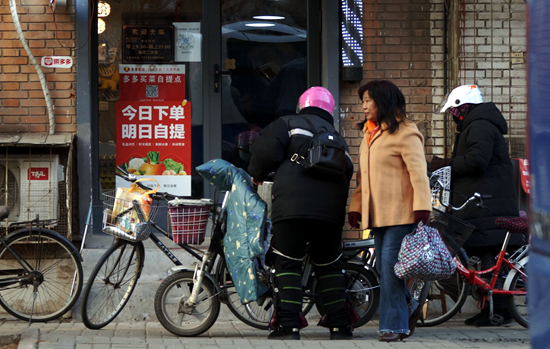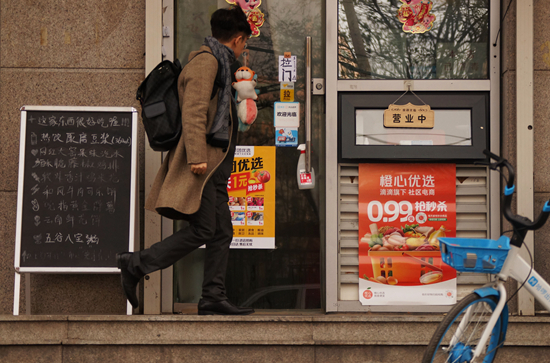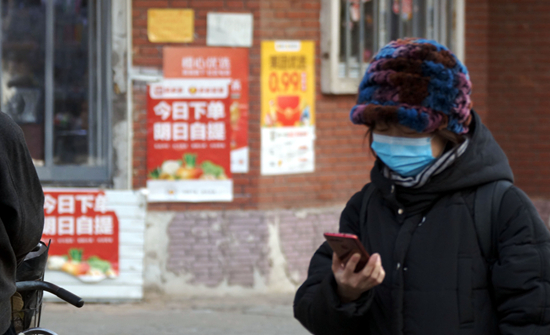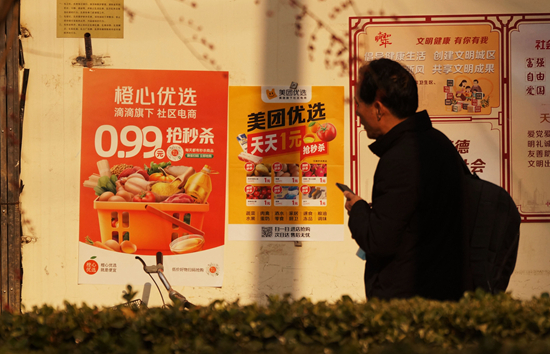
On December 19, Tianjin, several citizens walked into a community group buying self-pickup points.

A citizen walks past a community group buying poster in Tianjin on December 9.

On December 19, Tianjin, a citizen with a mobile phone walked past the poster of the community group buying in front of the supermarket.

On December 9, Tianjin, a citizen in Heping District reads a poster of community group buying.
The battle between Internet companies and the food market continues. When Internet Tech Giants began to enter community group buying, ads in community WeChat groups and coupons in mobile apps replaced the familiar shouting and bargaining sounds in the food market. People simply pre-order on their mobile phones, and the goods will arrive at the pick-up point selected by the customer the next day.
In the first month that some Internet companies started doing community group buying, the number of openings reached 120. At the end of November, an Internet Tech Giants announced that its community group buying has covered 200 cities, and the most one day, it opened stores in 36 cities.
Here, some people found that the original price of a few dozen yuan barbecue grill can be bought for only two yuan, and some people have bought a penny a catty of hawthorn, a fifty-cent egg, a catty of citrus.
After the rise of community group buying, some customers have reduced the frequency of going to vegetable markets and supermarkets. However, the low-priced products on the community group buying platform have also aroused the alarm of many people. Weilong, Xiang Piao Piao, Radar Battery and other brands have issued notices prohibiting distributors from supplying to the community group buying platform. Some wholesalers are worried about losing traditional supermarket users and are reluctant to supply hot-selling products to the community group buying platform. Some netizens are also worried that the Internet will attract customers with low-priced products and take away the livelihood of vegetable sellers.
On December 22, the State Administration for Market Regulation and the Ministry of Commerce held an administrative guidance meeting to standardize the order of community group buying. This meeting, attended by six Internet platform companies including Alibaba, Tencent, JD.com, Meituan, Pinduoduo and Didi, requires Internet platform companies to strictly abide by the "nine must not". Including, Internet platforms shall not dump at low prices, abuse their independent pricing power, predatory pricing without justifiable reasons, and shall not use data advantages to "kill", and shall not sell counterfeit and shoddy goods.
1
The battle for the entrance to the vegetable market began in the second half of 2020.
A full-time "head" (community group buying initiator) in Chengdu, who is involved in at least six community group buying platforms, has observed that every time a new platform enters, it always distributes large subsidies, and some even send free fruit, salt, napkins, etc. He studies the coupons issued by various platforms on a regular basis and recommends the most cost-effective platform to customers every day. His highest sales record is more than 500 people placing orders a day.
After the customer places an order, the Internet platform delivers the goods to his pick-up point. He notifies the customer to pick up the goods in time. The head of the team gets a 10% commission on each order. On the day of the most sales, the full-time head of the team received a commission of 1,500 yuan.
Since the sharing of bicycles, takeout, and online car-hailing, community group buying has become the battlefield of a new round of "price war". In addition to price, the head of the team who is good at managing interpersonal relationships is the "weapon" that Internet companies must compete for.
In a residential building in Jinan City, Shandong Province, 10 heads of delegation appeared, and the owner joked that "they can all make group buying according to the floor distinction." In Hongxiajiao Road, Shantou City, Guangdong Province, when customers opened a community group buying app on December 14, they were automatically matched with a self-pickup point. Four days later, 28 self-pickup points appeared on the 1.2-kilometer-long road.
A local supermarket owner in Baotou, Inner Mongolia province, said he had been greeting four or five rounds of salespeople from different platforms every day to persuade him to become the head of the department. He joined three of the internet platforms only when two rival local supermarkets became pickup points – he was worried that customers would flow to the other two.
The rural market has also become a battleground for Internet companies. As of December 21, the business coverage of the community group buying platform includes 15 provinces, 175 prefecture-level cities, more than 1,400 county-level cities, more than 5,100 townships and 42,000 villages.
A villager who has opened a grocery store in Longzhou Community, Miluo City, Yueyang City, Hunan Province for more than 20 years told China Youth Daily that before 2018, she went out every morning at 6 or 7 o’clock, went to the vegetable market to buy food, and brought it back to the grocery store for sale. The vegetable market in the town is a 26-minute walk from Longzhou Community. She recalled that the elderly people in the village who cook at home can’t travel long distances and can’t ride motorcycles. They have to ask relatives and friends to go to the vegetable market once a week to buy food and store it in the refrigerator.
After her son-in-law taught her to use the community group buying platform, she became the head of the group. During the epidemic, she was able to receive more than 200 orders a day. Now, an elderly person living alone asks her to place an order for fresh fruits and vegetables every day, and she helps the elderly deliver them to their door. She also bought a certain northern fruit on the platform, which has never appeared in the vegetable market in Miluo City.
An old couple in Shantou City didn’t even know the commission of the head of the group. Meituan’s preferred advertisement was already posted on the door of the grocery store they ran. The son took the initiative to help them apply to become the head of the group. Since then, this "never-doing" grocery store has welcomed more customers.
2
When the internet comes, business comes. Traffic blockages in Mayang Miao Autonomous County, Huaihua City, Hunan Province, which is rich in rock candy oranges and yellow peaches, once caused fruit sales to be slow. The head of a local agricultural product sales company said that after the community group buying platform purchased goods from his company, the company’s sales of rock candy oranges tripled. It became a hit on the platform.
But it’s not just traffic that the internet brings. Changsha, a city in Hunan province, is an important city in the community group buying war. This community group buying city has been developing for a long time and has a high penetration rate. It has attracted multiple Internet platforms to enter and grab customers. At Jinshang Fresh Market in Yuelu District, Changsha City, a vegetable vendor told a reporter from China Youth Daily China Youth Network that the "price war" of multiple Internet platforms has obviously affected her business. In the past month, her daily turnover has been reduced from 2,000 yuan to 300 yuan.
Previously, there were few community group buying platforms in Changsha, and the platform pricing was high, which had little impact on her business. But now, some customers tell her that they have bought 0.9 yuan a catty of potatoes and 0.68 yuan a catty of carrots on the Internet. But the wholesale price she bought back from the wholesale market was 1.6 yuan per potato and 1.3 yuan per carrot. Due to the decrease in traffic counting, her stall closing time was extended from 5 pm to 9 pm, but sales still did not improve.
The vendor runs a 6-square-meter stall in the market and has long supplied restaurants with vegetables. Once, a restaurant owner complained that the epidemic had hit the restaurant business. He wanted to cut costs and buy ingredients from the Internet platform. "Wait until you are about the same price as the platform, and I will buy your goods." Previously, she supplied more than a dozen restaurants. After the "price war" of the group buying platform began, only six restaurants continued to cooperate with her.
The wholesale market she frequented, which used to be stuck in traffic jams, is now smooth. Wholesalers are more enthusiastic than ever when they see her come to stock up, and hope she buys more. But to reduce inventory losses, she starts to choose storage-resistant vegetables such as potatoes and radishes. On her vegetable stand, there used to be nearly 100 items for customers to choose from, but now there are only more than 30.
While waiting for customers to come to the door, she sat with the vendor next to her and sighed. She did not tell her college-aged son or parents living in her hometown about these situations. In order to continue to support the family of old and young, the woman with a junior high school degree decided that after the Spring Festival next year, her husband will go to deliver food, and she will go to the restaurant to work as a cleaner.
It is difficult to count how many people’s livelihoods will be affected by Internet companies in this battle. In some areas where community group buying has just developed, there are vendors selling fresh pork who see that the platform only offers frozen pork, and only pork belly and pork belly are available. They think that community group buying will take a long time to develop before it will affect their livelihood. Others insist that customers who buy fruit in their own stores know better quality and do not overlap with Internet users.
In contrast, supermarket owners are more sensitive to community group buying than vegetable vendors. A community supermarket owner in Baotou believes that the quality, variety and origin of fresh food affect the final price, while the prices of goods sold in supermarkets are more transparent and uniform, and they are more disadvantaged in "price wars".
The supermarket owner told the China Youth Daily China Youth Network reporter to take a carton of milk from a certain brand as an example. The supermarket’s purchase price is 51 yuan, the supermarket’s lowest promotional price is 53 yuan, but the community group buying platform’s group buying price is 44 yuan. Six months ago, the supermarket could sell almost 10 cartons of this milk a day. Now, it only sells four or five cartons a week.
Potato chips have a similar experience. A certain brand of potato chips, priced at 5 yuan a barrel, ended up selling for 8 yuan a barrel, and the dealer and the supermarket each earned 1.5 yuan. But on the community group buying platform, this potato chip sells for only 3 yuan. The supermarket owner explained, "If the snack expires, the dealer needs to transfer the goods and recycle the snack from the supermarket, and the group buying platform directly connects with consumers, so there is no need to worry about the risk of expiration."
This mom-and-pop community supermarket has had six consecutive months of customer growth, new customer growth, and declining operating income. The boss chose to remove non-staple food and fruit from the shelves.
3
More and more people are realizing that unusually low prices can bring new problems.
A manufacturer of seasonings forbids distributors from supplying to community group buying platforms. The person in charge told China Youth Daily and China Youth Network that in the past six months, the factory has received complaints from partners all over the country, saying that the price of seasonings sold by community group buying platforms is too low, which disrupts the original market and leads to confusion in supply.
A snack wholesaler in Baotou City, when meeting his peers, the topic of community group buying is always unavoidable. He believes that every wholesaler who supplies to the platform can make money, but this way of making money is not sustainable. After the platform grows, it will directly bypass the wholesaler and pick up the goods from the production factory.
He supplies six small supermarkets near a school in Baotou. These six small supermarkets are going to boycott the community group buying platform and refuse to be the head of the group. The reason is that although the head of the group can get a 10% commission on sales, it affects the normal sales of the supermarket. If customers buy goods in the supermarket, the supermarket can earn 15%, which is more than the head of the group. Wholesalers persuade supermarkets to follow the crowd. He worries that if the stationery store and washing shop near the supermarket become self-pickup points, it will divide the flow of people in the supermarket.
Due to the different development of community group buying in different places, the quality of low-priced goods on the platform varies. In rural Hunan, users can buy fresh fish in vacuum packaging, while in Baotou, where community group buying is developing slowly, some users have purchased fruits and vegetables that are not heavy enough.
A customer in Baotou once spent 5.68 yuan to buy three Xinjiang Aksu rock candy apples that were claimed to be "sweeter than first love" and crispy, sweet and juicy. But the apples he actually got were only the size of ordinary lemons, and the user asked for a refund. The head of the group felt that it was a pity to throw it away. After eating a few bites, he found that it was not the rock candy heart apple advertised by the platform.
Almost all participants are aware that the subsidy war for community group buying will not last for a long time. In mid-December, several heads of state in Chengdu received a price adjustment notice issued by Didi’s community group buying platform, Chengxin Preferred, saying that commodity prices would be adjusted to ensure the healthy development of the community group buying industry.
Nearly 70 Chengdu heads of state analyze the latest policies and trends of each Internet platform in the WeChat group. The heads of state are most concerned about "de-delegation". Some heads of state analyze that if the community group buying platform starts arranging riders to deliver goods in the future, or opens brick and mortar stores, the usefulness of the heads of state will become less and less.
He has a deep sense of urgency: "We don’t have the initiative, everything is in the hands of the platform." The way out of his plan is to retrieve high-quality fresh food from major platforms and put it on the shelves of the group buying platform he formed.
However, community group buying has not slowed down due to doubts and criticism. On the contrary, more companies are interested in testing the waters in this track. A senior head of Chengdu said that two new Internet Tech Giants are ready to start community group buying business, and their salespeople recently invited him to join the platform.
Community group buying first appeared in 2015. In 2019, many community group buying platforms encountered an operational crisis. Some platforms withdrew their stations and laid off staff in many places, and some platforms chose to merge. The consensus in the industry is that the epidemic has boosted the development of community group buying. According to media reports, during the epidemic, Xingsheng’s orders in Wuhan increased dozens of times; some platforms covered thousands of communities in Wuhan, with more than 350,000 active users. To this end, the Wuhan Municipal Bureau of Commerce also coordinated buses and postal vehicles for transporting goods from community group buying.
A company that is developing community group buying said that the epidemic in 2020 prompted the company to make up its mind to develop community e-commerce. The company found the potential of community group buying model from multiple dimensions: unsalable agricultural products, farmers can’t buy cheap good things; some urban residents’ unmet shopping needs; it is difficult to travel in extreme weather, and the vegetable market is far from the residential area.
In the summer of 2020, multiple Internet platforms entered the community group buying. In June, the Orange Heart Preferred Mini Program was officially launched. In July, Meituan launched Meituan Preferred, focusing on the lower-tier market. In August, Pinduoduo’s Duoduo Shopping Mini Program was put into trial operation.
Predictably, this silent wet market will continue to hustle and bustle. With the encouragement of salespeople, groups of stay-at-home mothers have joined the ranks of the leaders. New users are experimenting with placing orders on the Internet. New cities appear on the map of community group buying.
At the same time, the relevant rules are also being introduced one after another. On the 22nd, the community group buying "nine must not" new regulations were introduced. Before that, on November 10th, the State Regulation for Market Regulation announced the "Anti-Monopoly Guidelines on the Platform Economy (exposure draft) ", which mentioned that platform operators through subsidies, discounts, discounts, discounts, traffic resource support and other incentive methods may have a certain positive effect on the interests of platform operators, consumers and the overall welfare of society. However, if there is a significant exclusion and restriction of market competition, it may be determined to constitute a restricted transaction behavior.
According to media reports, on December 9, the Nanjing Municipal Market Supervision and Administration Bureau took the lead in the country to issue the "E-commerce" vegetable community group buying "compliance management notice", requiring the head of the vegetable community group buying to handle the corresponding market subject registration as appropriate, and platform operators shall not implement low-price dumping at a price lower than cost, crowding out competitors to monopolize the market and disrupting the normal business order.
In an interview with China Youth Daily, a staff member of the community group buying platform also believes that the development of community group buying should be gradual, which will not seriously affect the livelihood of small traders and hawkers, but also create many jobs at the same time. The ongoing price war has disrupted the balance of the ecological chain. He cannot predict when the price war will end, "the short term is half a year, the medium term is one year, and the long term may be three years".
(The pictures in this article are all provided by Visual China, China Youth Daily · China Youth Network trainee reporter, Wei Xi)